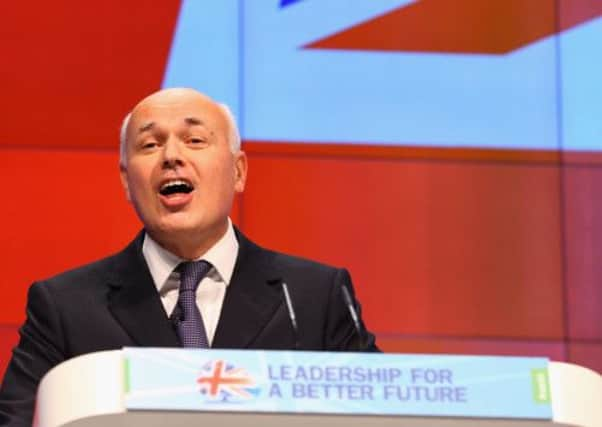10,000 Scots children to be hit by UK benefits cap


• Iain Duncan Smith says benefit cap has seen a “very, very significant” increase in number of people looking for work in affected households
• Couples and lone parents will receive no more than £500 a week under new scheme, with single people limited to £350 per week
Advertisement
Hide AdAdvertisement
Hide AdCitizens Advice Scotland (CAS) said more than half of the households affected by the £500-a-week cap would be at least £50 a week worse off, while more than a quarter will lose at least £100 a week.
Work and Pensions Secretary Iain Duncan Smith defended the new policy yesterday, saying it had encouraged people on benefits to go back to work in areas where the new rules had been piloted since April.
However, the Scottish Government warned the cuts could have a “serious and harmful impact” on vulnerable people.
Couples and lone parents will not receive more than £500 a week under the new cap, with single people limited to £350.
CAS chief executive Margaret Lynch said many of the households affected were already struggling to get by and may have to cut back on essentials such as food or energy as a result.
“This cap comes on top of a long series of other benefit cuts, and so is just the latest blow to hit hard-pressed families in Scotland,” she said. “The people affected will be those in areas where rents are higher, but that doesn’t mean they are well-off. In fact, it could mean they struggle even more than most.
“We estimate that 1,300 families will be at least £5,000 worse off per year as a result of this cap. That’s a huge amount to lose if you are on a low income.
“The money they will lose is not being spent on luxuries, but on essential living costs. In practice, those affected by this cap will be faced with three choices. They will either have to cut back on rent, food or fuel. That’s the reality of this benefits cap. Families with children will face eviction, poverty, hunger and cold.”
Advertisement
Hide AdAdvertisement
Hide AdMr Duncan Smith insisted a “very, very significant number” of people had gone out to work in affected households in the four London boroughs where the cap has already been implemented. He added: “This is both about saving money and, more particularly, about changing a culture that had left families, particularly large families, finding it easy and a reality for their lives to stay out of work on taxpayers’ benefits.”
He rejected suggestions jobs were not available for claimants who wanted to go back to work.
“The private sector has been providing jobs,” he said. “Every week, something like half a million new jobs are in the Jobcentres and out in the universal job match we have now produced.”
A spokeswoman for the Scottish Government said: “The UK government is pursuing a set of welfare reforms that will have a serious and harmful impact on vulnerable people in Scotland.
“Scottish Government analysis suggests the cumulative impact of the welfare reforms over the five years to 2014-15 could result in the Scottish welfare bill being reduced by over £4.5 billion.”
Matthew Reed, chief executive of the Children’s Society, accused the coalition of trying to use a “blunt instrument” to solve a complex problem.
“The debate has focused solely on workless adults, but the reality is children are seven times more likely than adults to lose out,” he said. “And almost half the adults affected will have children aged four or younger, and would find it extremely difficult to be in work, even if they could afford childcare, which can cost as much as £100 per child per week.”
But Matthew Sinclair, chief executive of the TaxPayers’ Alliance, said: “The people funding the benefits system through their taxes should never find themselves subsidising a lifestyle for others which they cannot afford for their own families.”
SEE ALSO